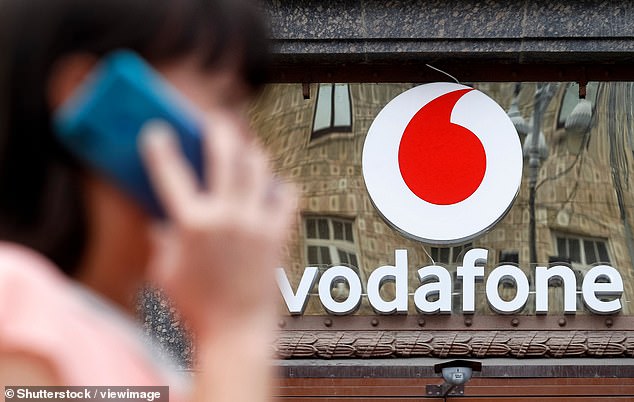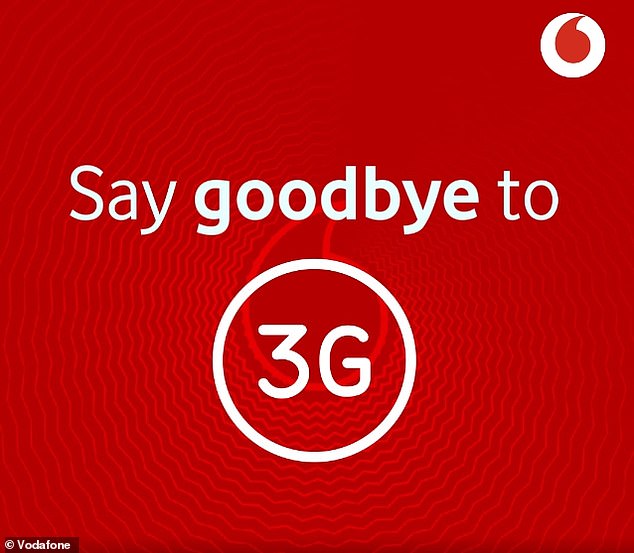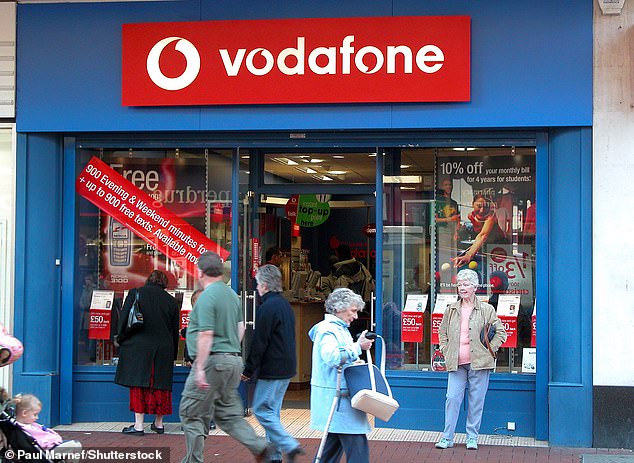Check your phone NOW: Vodafone has disabled its 3G network, leaving millions of Brits unable to use the internet on their smartphones – how to tell if it’s affecting you
It ushered in an era of high-speed communications, allowing us to access the Internet on the go for nearly two decades.
But 3G’s days appear to be numbered, as one of Britain’s biggest mobile operators has finally ended the service.
Vodafone has switched off its 3G network so it can invest more money in 4G and 5G, which the majority of its customers now use.
However, it means that Vodafone customers with old 3G smartphones that do not support 4G or 5G – such as the iPhone 5 and older – will have to buy a new phone.
Here’s how to tell if the change will affect you.
Vodafone’s decision to switch off 3G means that customers with old phones that do not support 4G or 5G – such as the iPhone 5 (pictured) or older – will have to buy a new device
Vodafone assures that the vast majority of smartphones will not be affected by this, as they run on 4G or 5G.
However, models that run on 3G include the iPhone 5 and earlier and the Samsung Galaxy S4 and earlier.
Users of these models will need to upgrade to a newer device if they want to continue using the internet on the go, although they will still be able to make calls and send text messages.
Vodafone announced the national 3G freeze in early 2022, before it was phased out from June last year.
It claims the shutdown – which was finally completed this week – will allow the company to become more energy efficient and focus on its 4G and 5G networks.
“Our focus remains on building Britain’s most reliable mobile network and to continue to do this we must ensure our technologies are fit for purpose,” said Andrea Dona, Vodafone’s UK network director.
“Now it’s time to say goodbye to 3G and focus on the current benefits and future possibilities of our 4G and 5G networks.”
Mr Dona said Vodafone’s 4G and 5G network will become “stronger and faster” by repurposing 3G spectrum – the invisible radio frequencies over which wireless signals travel.
A switch from 3G will also reduce the company’s impact on the environment, as modern 5G networks are more than ten times more energy efficient than old 3G equipment.
The retirement of Vodafone’s 3G network is also “a key part” of its aim to reach net zero for its UK operations by 2027.

Vodafone has disabled its 3G network, meaning many feature phone users will have to upgrade to modern devices (stock image)

By discontinuing 3G, Vodafone can redeploy 3G bandwidth, meaning its 4G and 5G networks will get a speed and capacity boost so customers can enjoy a better connection
Net zero – a term many companies use to tout their eco credentials – refers to the balance between the amount of greenhouse gas it produces and removes from the atmosphere.
According to experts at Vodafone, sending a terabyte of data over the 5G network costs seven percent of the energy required to send the same amount of data over the 3G network.
A spokesperson for Vodafone told MailOnline that it could not reveal how many of its customers were currently using 3G.
However, less than four percent of customer data is used on Vodafone’s 3G network, compared to more than 30 percent in 2016.
According to recent research from Uswitch.com, seven percent of the UK’s 2,000 adults – potentially several million people – say it’s the only network they have access to.
Some critics argue that getting rid of 3G will force people to buy new phones, making older devices obsolete.
Dennis Reed of campaign group Silver Voices said: ‘This decision by the giant telecoms companies is an unnecessary and cynical move to force as many customers as possible onto smartphones and the 4G and 5G networks.’
Amazingly, Vodafone’s 2G network, 3G’s predecessor, is still active and the company has no plans to shut it down anytime soon.
Vodafone’s 2G network, which currently covers more than 99 percent of the UK population, will remain available for calling and texting, but customers will not be able to access data on it.
Vodafone is keeping 2G because it is a “truly universal technology”, according to a spokesperson, although telecoms companies have agreed with the UK government to phase out 2G by 2033.

The first 3G voice call in Britain was made by Vodafone in April 2001, although the 3G mobile data network was in use until 2005. Pictured: a Vodafone store in Bristol, 2003
The first 3G voice call in Britain was made by Vodafone in April 2001, although the 3G mobile data network was not launched until 2005.
This was two years after rival Three launched on March 3, 2003 as the UK’s first 3G network.
The end of Vodafone’s 3G is another nail in the coffin for the communications standard that ushered in the era of convenient and relatively fast mobile Internet.
Although we take it for granted now, 3G was considered revolutionary because it allowed users to surf the Internet, check emails and access basic applications on the go.
In the UK, there are four mobile operators that own the mobile network infrastructure – Vodafone, Three, EE and O2 – but all have shut down or are in the process of shutting down their 3G networks.
EE started closing its 3G network in January, while Three aims to close it by the end of this year.
O2, meanwhile, will end 3G by the end of 2025.
